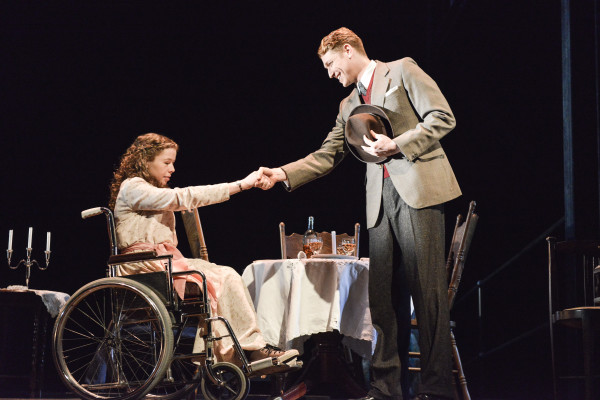In Giles Croft’s new production of The Glass Menagerie, an intimidating, bulky metal stairwell rises into the flies on one side of the stage. Tim Meacock’s set makes effective use of negative space by exaggerating the stage’s height through this aspirational ladder, while grounding the adjacent home of the Wingfield’s on a flat, stage-level platform. The oppressive weight of imagined floors above presses down on a family slowly suffocating in a crowded, outdated apartment. It’s an effective visualisation of a claustrophobic production in which a stellar cast are all trying, in their own ways, to escape.
By casting an actor (Amy Trigg) who uses a wheelchair as Laura, the production adds to Williams’s play an additional layer of denial and negotiation to the Wingfields’ life. Mother Amanda (Susannah Harker) slams down on any use of the word ‘cripple’ until the word bursts from her mouth in her final outpouring of grief. The ground-floor apartment has a ramp, but Amanda and son Tom (Chris New) still jump in fear when Laura’s chair slips as she leaves the house. The imagery of the fragile glass menagerie might seem to indicate Laura, but she is nimble and manoeuvres herself easily around the apartment – rather, it is the nervousness and delicacy of Amanda and Tom’s behaviour around Laura that is evoked in the trepidation with which characters pick up the glass animals.
Laura is the production’s heart. Her warmth, her constant smile, her easy affection are freely given at all times, and her quiet withdrawal from moments of conflict is a further indication of her good nature. This nature is compromised by her fear of her mother; the smile remains as she nervously tries to avoid raising the subject of her dropped classes, and her terror of being forced into social situations causes her to bury her head and hide. But she earnestly implores her mother to understand her joy in visiting art galleries and the zoo, and her delight in simple pleasures – the yearbook, the gramophone, and of course the menagerie – is childlike and infectious.
The standout scene thus is the long interaction between Laura and her gentleman caller and childhood crush, Daniel Donskoy’s Jim. Jim is a poster boy for self-improvement and positivity; while his insistence on diagnosing and explaining Laura’s feelings to her is positively offensive, he also shows her a sensitivity previously lacking. The moment as Jim raises Laura to her feet to hold her in a dance, and then leads her to her wheelchair so they can dance properly – and for a moment beautifully until they knock the table holding a precious glass unicorn – is magically transformative. Trigg, Donskoy and Croft push the potential of the moment to a heartbreaking degree of hope, even leading to a sweet kiss, before Jim destroys everything with the revelation that he is already engaged.
The dashed hope of this moment is only one of the production’s repeated, effective moments of escape denied. Tom has a wiry energy that repeatedly pushes him out onto the metal stairwell, smoking and twitching, falling back continually on his repeated claim that he is ‘going to the movies’. He is the only character with access to the upper levels of the fire escape, from which he descends to begin his narration. The tension of New’s performance as the Narrator of the future pulls against the apartment-bound son of the past is vital, and key to the production’s energy when pitted against Harker’s stasis. In one scene, the exception that proves the rule, Amanda joins her son on the fire escape to look at the moon, and seems to lapse into youth, her easy smile and good humour coming to the fore. Inside the flat, especially when dressed in her ludicrously dated reception outfit, she is mannered and precise, unable to stop talking but poised as if imagining herself as a character in the magazines she sells. It’s a grandstanding performance that desperately clings to a past that is long gone and, as she piles pressure on her children, the storm that builds throughout the production comes to a head and explodes in a spectacular shower of rain.
While the production plays with melodrama as Amanda’s delusions of Southern hospitality extend to desperately trying to keep Jim in the flat, the production’s real strength is the complex characterisation. The final confrontation between Tom and Amanda is underplayed, stated rather than shouted, and the more effective for its coolness. Tom’s frozen humiliation when he sees his sister and mother costumed to meet their gentleman caller is mirrored in Amanda’s stillness as she learns Jim’s romantic situation. And in between scenes, the stillness of the cast is captured in blue light and the sound of musical glasses and glockenspiels, capturing the fragility of all these individuals. The delicacy of Croft’s approach renders its heightened moments all the more compelling; ultimately, Laura’s destiny is neither grand drama nor Southern romance, but a quiet slip into darkness, ending with the estranged Tom watching from the sidelines as she slowly blows out her candles.
The Glass Menagerie is on at the Nottingham Playhouse until 26th March 2016. Click here for tickets.


